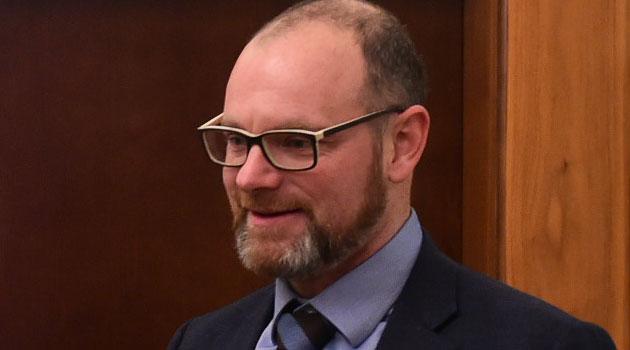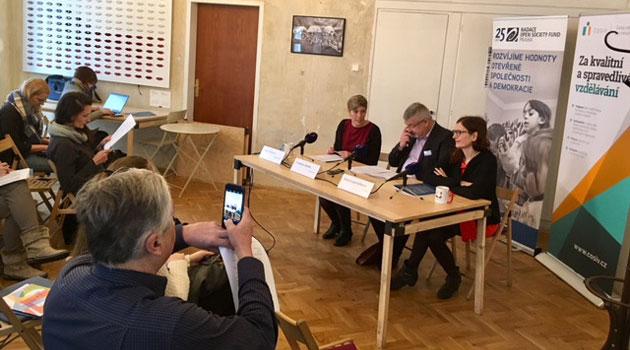RESPEKT: Czech EdMin considering amendments that could undo inclusive education

Václav Krása, a former MP who has long been the chair of the Czech National Disability Council, recently called for an immediate meeting with acting Czech Education Minister Robert Plaga (ANO). Krása has gotten wind of the proposed amendments to a ministerial decree about educating children with special educational needs (better known as the “inclusion decree”).
The changes Plaga’s ministry wants to undertake startled Krása. If they are adopted, there is a danger that children using wheelchairs, with auditory and visual impairments, or with other medical disabilities would have more difficulty accessing mainstream schools than they do today.
The primary reason is that the ministerial proposal will limit the number of assistants who can work in the same class at once. While according to the current wording of the decree, which has been in effect since 2016 and was created under Education Minister Kateřina Valachová (Czech Social Democratic Party – ČSSD), schools can receive funding to pay for up to three assistants in one class, Plaga’s amendment would allow just one.
“The decree, for the time being, is not yet part of the internal comments procedure, we have seen a version of it and we do not know whether this is the final version,” explained Krása last week when asked why he has not yet called a press conference to communicate this alarming message. He said that he had immediately written to the minister and because he never received an answer was planning to “chase him down” last week to explain to him how such changes would complicate the lives of children living with disabilities.
The Czech Society for Inclusive Education (ČOSIV), which was co-founded by former Deputy Education Minister Klára Laurenčíková, is also on alert. “There are dangerous things in that amendment,” Laurenčíková says.
Plaga’s amendment, in her view, essentially erases the rules for educating all children together. What would no longer be there is the general message that as many children as possible are meant to attend mainstream education and that mainstream education always takes precedence over any kind of “special school” if possible and if parents want their children in the mainstream.
What’s more, the amended decree directly opens the way for “special schools”, designed for children with mental disabilities, to once again also educate non-disabled children. It destroys a taboo that the former minister managed to advocate for and then enforce only with great difficulty.
The sentence in the inclusion decree reading “Pupils without mental disabilities shall not be educated in classes, departments, schools or study groups for pupils with mental disability” is simply crossed out in the amended decree. If adopted, this would return the Czech Republic back to the state it was in before 2007, when a group of 18 young Romani people from Ostrava succeeded at the European Court of Human Rights with their complaint that their automatic recommendation for enrollment into “special schools” meant the state had discriminated against them.
That court took into consideration the fact that Romani pupils were the predominant population in the “special schools” and found that it did not see any benefit to their being instructed according to a reduced curriculum because that just exaggerates the cultural and social gulf that exists between the majority society and Romani people in the Czech Republic. The success of the Romani plaintiffs in court began to change the practice in Czech schools, and immediately the following year the number of children attending the “practical primary schools” began to decline.
Over the next few years the number of children with “mild mental disability” attending mainstream schools increased fourfold, from 3 % to 12 %. The “inclusion amendment” to the Education Act and its related inclusion decree did not cause a revolution, but basically just copied the trend that had begun.
Advocates of inclusion remind the public that educating children with different gifts and motivations together is customary in many countries. The level of education achieved does not decline as a result – on the contrary, children living with disabilities rapidly accelerate to catch up with their non-disabled peers and the general degree of tolerance of difference increases among school communities as a result.
The decree and the law were also meant to assure schools that they would receive funding to support pupils with special educational needs. Prior to these changes, it had frequently been the case that schools hired assistants but were unable to find funding for them and had to cut spending on the salaries of the rest of the staff, teachers included, to cover the assistant’s salary.
The education of all children together, nevertheless, has had powerful critics from the beginning. Czech President Zeman alleges that it is unfortunate for both those living with disabilities and the non-disabled because the children living with disabilities allegedly hold back the others, saying that “the speed in a certain lane is determined by the speed of the slowest vehicle”, and that non-disabled children will be worried by this because they would be “happier in a community of equals.”
Czech MP Václav Klaus, Jr (Civic Democratic Party – ODS), the current chair of the Education Committee in the lower house, even said inclusion was a “crime against children nwith mental disabilities” and alleged they were being “forced en masse into normal primary schools”. Both Krása and Laurenčíková hope Czech Education Minister Robert Plaga will hear them and that the decree will not be adjusted so as to destroy inclusion.
The Czech Education Ministry has not yet made any public statements about its plans or its willingness to eventually change them.
First published in Czech by RESPEKT on 21 May 2018.
